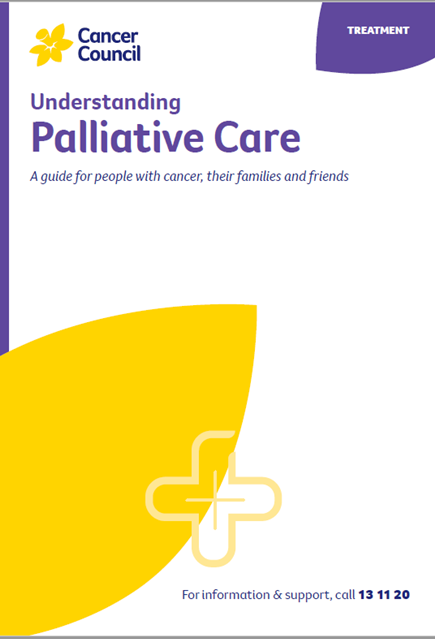- Home
- About Cancer
- Advanced cancer
- Palliative care
- Palliative treatment
Palliative treatment
Medical treatment is a key part of palliative care. It aims to manage the symptoms of cancer without trying to cure the disease.
Learn more about:
Overview
The treatment you are offered will depend on your individual needs, what type of cancer you have, how far it has spread, your symptoms, any other health issues and the support you have.
Some examples of palliative treatment include:
- radiation therapy to reduce pain (e.g. if cancer has spread to the bones, or a tumour is pressing on nerves or organs)
- chemotherapy or targeted therapy to stop the cancer growing into other organs
- surgery to reduce tumours causing pain or other symptoms
- medicines to control symptoms and relieve discomfort.
See more on the types of cancer treatments that can be used palliatively. Let your health care team know about any side effects you may have so they can be managed.
Making treatment decisions
You have the right to say no to any treatment recommended, but your medical team needs to be sure that you understand what treatments you’ve been offered, and how not having a treatment may affect your prognosis, symptoms and quality of life.
You can ask questions about treatments and what side effects or “trade-offs” these may have. It might be important for you to know about recovery times, length of hospital stay or physical benefits or risks. You may want to ask what to expect if you don’t have treatment.
Bring a friend or family member to appointments to help you make decisions and use the question checklist as a guide.
You do not have to accept treatments on an all-or-nothing basis – you can refuse some and accept others. You can try a medicine to see if it helps you and then talk to your doctor about whether to continue. Treatments can cause significant side effects, and some people choose not to have active treatment for the cancer but to focus on controlling their symptoms to reduce pain and discomfort. You may want to discuss your decision with your treatment team, GP or family and friends, or call Cancer Council 13 11 20.
For more on this, see Living with advanced cancer and Cancer care and your rights.
Podcast: Treatment Options for Advanced Cancer
Listen to more of our podcast for people affected by advanced cancer
→ READ MORE: Common palliative treatments
More resources
Prof Meera Agar, Palliative Care Physician, Professor of Palliative Medicine, University of Technology Sydney, IMPACCT, Sydney, NSW; Anne Booms, Nurse Practitioner, Palliative Care, Icon Cancer Centre Midlands, WA; Nicola Champion, Consumer; John Clements, Consumer; Dr Alexandra Clinch, Palliative Medicine Specialist and Deputy Director, Palliative Care, Peter MacCallum Cancer Centre and Royal Melbourne Hospital, VIC; A/Prof Jaklin Eliott, School of Public Health, University of Adelaide, SA; Dr Jemma Gilchrist, Clinical Psychologist, Mind My Health, NSW; McCabe Centre for Law and Cancer, VIC; Caitlin MacDonagh, Clinical Nurse Consultant, Palliative Care, Royal North Shore Hospital, NSW; Dr Roya Merie, Radiation Oncologist, Icon Cancer Centre, Concord, NSW; Dr Deidre Morgan, Research Centre for Palliative Care, Death and Dying, Flinders University, SA; Caitriona Nienaber, 13 11 20 Consultant, Cancer Council WA; Palliative Care Australia.
View the Cancer Council NSW editorial policy.
View all publications or call 13 11 20 for free printed copies.

